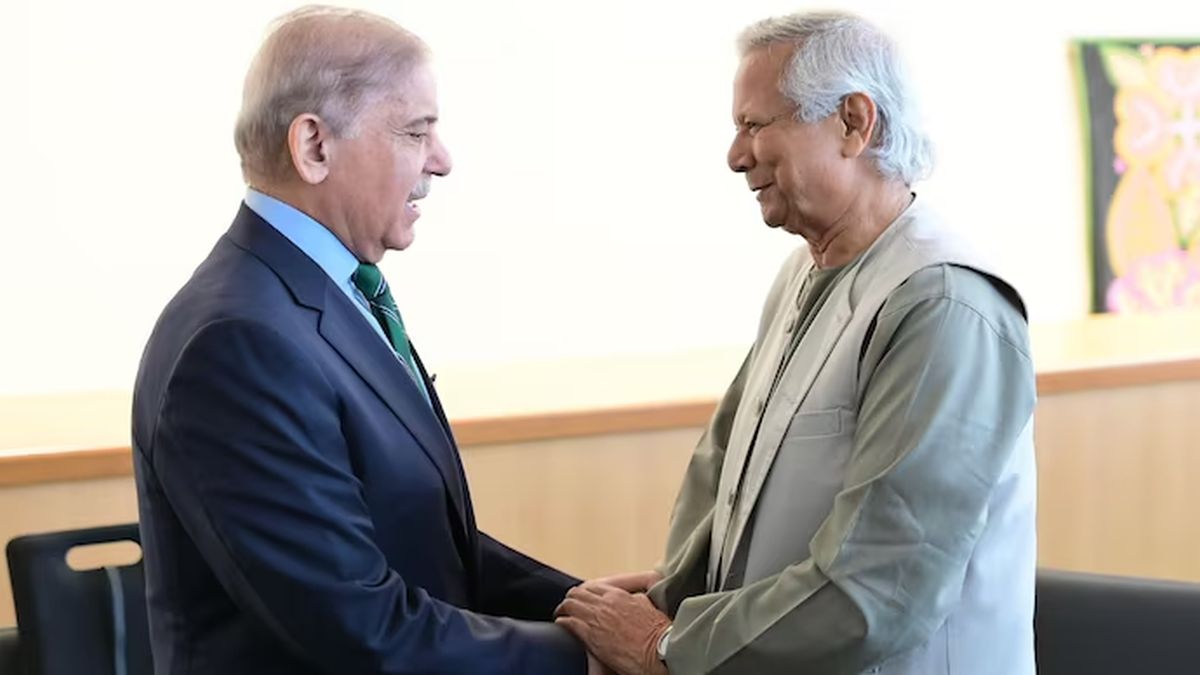In a significant shift in diplomatic relations, Pakistan and Bangladesh appear to be rekindling their ties, previously marred by historically strained relations.
A series of collaborative initiatives signal a new era of cooperation between the two countries. These include Bangladesh opening a sea route for ships from Pakistan, allowing entry without stringent checks, and relaxing the visa regime to enable Pakistani visitors to enter without prior scrutiny. Additionally, Pakistan has introduced a fellowship programme for Bangladeshi students and scholars, along with an agreement for army training between the two countries.
Pakistani Foreign Minister Ishaq Dar’s forthcoming visit to Dhaka — the first by a Pakistani foreign minister since 2012 — has invigorated efforts to strengthen relations with Bangladesh in light of the changing political landscape.
Bangladesh Chief Adviser Muhammad Yunus and Pakistan Prime Minister Shehbaz Sharif had met at the D8 Summit in December 2024, agreeing to strengthen ties between their countries.
Yunus urged Sharif to address the unresolved issues from 1971 to help Dhaka move forward.
In response, Sharif acknowledged the 1974 tripartite agreement with India as a resolution but expressed willingness to review any outstanding matters.
Here’s a look at latest initiates being taken by the two governments:
Pak foreign minister’s impending visit to Bangladesh
Pakistani Foreign Minister Ishaq Dar is set to visit Bangladesh next month for the first time in nearly 13 years, following a political shift after the fall of the Sheikh Hasina government.
Impact Shorts
More ShortsDar described Bangladesh as Pakistan’s “lost brother,” saying that his upcoming visit to Dhaka will be “crucial.”
Speaking at a press conference last week, Dar said he is likely to visit Bangladesh on or after February 5 after returning from a Malaysia tour from February 3-5.
This trip is seen as Pakistan’s effort to revive ties that have declined during Hasina’s four terms in office since 2008, which ended abruptly with her ousting in August amid mass protests. “We will work, support and cooperate on the economic and trade fronts, and things are moving fast on these fronts,” Times of India quoted Dar as saying, adding that he was invited by Chief Adviser Muhammad Yunus during the D-8 Summit in Cairo in December.
His visit will be the first by any Pakistani foreign minister since 2012. Former foreign minister Hina Rabbani Khar was the last foreign minister to travel to Dhaka in 2012.
According to The Express Tribune report, foreign minister Dar also confirmed that Yunus has accepted Pakistan’s invitation to travel to Islamabad at mutually agreed dates.
Pakistan varsity, OIC body launch fellowship programme for Bangladeshi students, scholars
The Organisation of Islamic Cooperation’s (OIC) ministerial standing committee on scientific and technological cooperation (COMSTECH) has partnered with Pakistan’s University of Lahore to launch a scholarship programme for Bangladeshi students and scholars, according to state-run media on Sunday. The initiative comes amid efforts by both Bangladesh and Pakistan to mend historically strained relations following the ousting of former Prime Minister Sheikh Hasina in August last year through a student-led movement.
According to the Associated Press of Pakistan (APP), the scholarship programme is available to Bangladeshi nationals aged 22 to 45, regardless of their location. Benefits include tuition fee remission, round-trip airfare, an honorarium, and free accommodation.
““This fellowship programme is a testament to our commitment to bridging gaps in education and research across the Muslim world,” Times of India quoted Muhammad Iqbal Chaudhary, COMSTECH’s coordinator general, as saying. He added that by investing in Bangladeshi scholars and students, they aim to cultivate a generation of innovators and leaders ready to tackle contemporary challenges. Eligible candidates can apply for scholarships until March 1.
Bangladesh planning to buy Abdali missiles from Pak
Amid escalating tensions between India and Bangladesh, Dhaka is reportedly considering the purchase of Abdali Short Range Ballistic Missiles (SRBMs), also known as Hatf-2 missiles, from Pakistan as a deterrent against potential Indian aggression.
According to an intelligence report by the defense website Indian Defence Research Wing (Idrw), Bangladesh has approached Pakistan for these 400 km-range missiles.
The report suggests that Pakistan may agree to the request to bolster its regional influence by supporting Dhaka, which is currently at odds with New Delhi. Moreover, selling the Abdali SRBMs is unlikely to significantly alter the strategic balance, as these missiles are short-range and primarily aimed at India.
However, to fulfill Dhaka’s request, Islamabad will need to navigate global arms control frameworks, such as the Missile Technology Control Regime (MTCR), which could impact the final decision, despite neither country being a member.
Experts warn that if Bangladesh acquires these missiles, the Abdali SRBMs — used by the Pakistani Army — could pose a considerable threat to India’s northeastern states.
Developed by Pakistan’s Space Research Commission (SUPARCO), the Abdali missile system is designed for quick reaction battlefield scenarios and provides a tactical edge to the Pakistan Army in such situations.
Pakistan, Bangladesh ink Army training agreement
The Pakistan Army is set to officially train the Bangladesh Army starting February 2025, marking the first such arrangement since 1971. The development comes as India reevaluates its strategy, particularly concerning the northeastern states, amid growing tensions.
Beginning next month, the Pakistan Army will provide training at four Bangladesh army cantonments, starting with the Mymensingh cantonment, which houses the doctrine and training command headquarters. Officers of Major General rank from Pakistan are scheduled to visit Bangladesh to oversee the training of soldiers.
The agreement follows the decision of Yunus to improve relations with Islamabad, leading to several policies favoring Pakistan in recent months.
The proposal for military training was initiated by Pakistan’s Chief of Staff Committee Chairman, General S Samshad Mirza, with the training programme slated to last for one year. As these developments unfold, Indian officials remain vigilant about the implications for regional security.
With inputs from agencies


)

)
)
)
)
)
)
)
)



